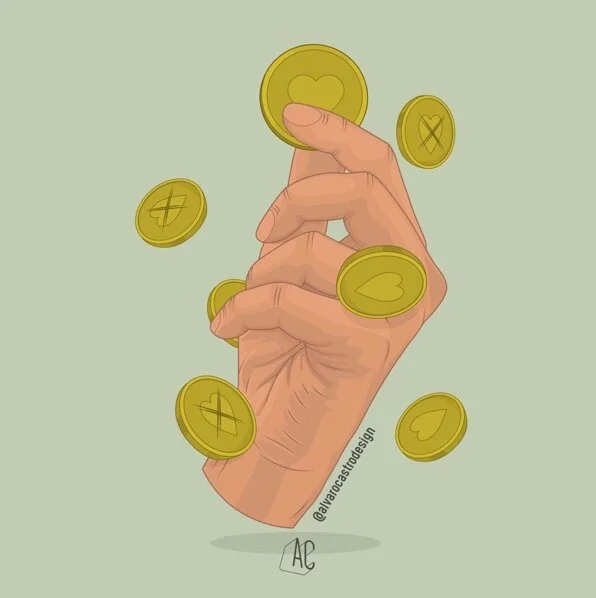More Money, More Partners - More Problems?
Art by @alvarocastrodesign
Picture this: you're deep in NRE bliss. You've recently met someone new, and you're enjoying all the beautiful aspects of getting to know them; their love language, their communication style, maybe their erotic blueprint, their approach to money management... *record scratch*!
Did that last one - money management - trigger an immediate stress response? You're not alone, but financial planning is a part of any relationship design. The tangling of finances can be a way to define a relationship as it grows and, even though it can be uncomfortable to discuss, it's a vital life skill.
...
Why is money so hard to talk about?
Like so many things on our radar, money and the discussion around it are #changethenoise goals. The status quo, the social norm, is that money is not something you talk about. In part, that has to do with those in power seeking to disenfranchise, and it also relies heavily on social constructs.
For those of us living in capitalist structures, there is a value attachment to earnings. The value label can come to feel like it defines us, and if we think we are worth too little, it can lead to feelings of fear and shame. Additionally, there is a direct correlation between money and safety. Money equals healthcare, better food, a better education - all those needs that are core to safety and safety has a significant impact on how we show up in relationships. Considering basic attachment styles - how we feel about ourselves and how we feel about other people - if our safety needs aren't being met, we will bring those more negative attachment styles into our relationships.
Conversely, non-capitalist systems offer a more comprehensive safety net. In observing societies that are assured their basic needs will be provided for by the state, we can better understand our own difficulty around talking about money. In capitalist systems, money can literally be a matter of life or death. If you lose your job or don't earn enough, you may not be able to support your family or afford health care. When the state ensures shelter and sustenance, people bring a more secure attachment style to their relationships. This means they are more likely to not only be more comfortable talking about money but also more likely to leave relationships that aren't serving them because partnership doesn't always equal extra access and privilege.
It is, especially for those of us living under capitalism, an act of defiance to become comfortable around money conversations in your relationships. Want a way to challenge the status quo? Talk about money; talk about money with your friends, your lovers, your family, your dentist...
How do we need to think about budgeting and finances differently in open relationships?
There are a few schools of thought when thinking about non-monogamy and resources that came up for us when discussing money in episode 71 of the Curious Fox Podcast: Moms, Money & Meet Ups.
One acknowledges that some types of non-monogamy can require access to resources. If you have to prioritize basic needs like paying the bills, buying food, and keeping a family safe, it can feel like engaging in multiple relationships would spread you too thin. Even if you’re more financially stable, dating and relationships can be costly and more dates and more relationships mean more costs. Perhaps you’re into lavish dinners out or you are in a construct that requires you to maintain multiple homes, maybe your partner's love language gifts, whatever the case may be, the spending considerations in relationships can add up. In addition to being more expensive in some situations, non-monogamy is not a protected class. This means you can get fired from your job, lose privileges to your children and face other discriminatory actions depending on your workplace, etc.
Another way of thinking about non-monogamy, however, considers how multiple relationships can support financial stability in the home. A thriving polycule can raise the economic status for some groups; more people equal more pooled resources. These communities can also economize time; perhaps one partner agrees to provide childcare while one goes on a date, thereby removing an expense and a time consideration. Similarly, non-monogamy, depending on your structure, does not need to affect an individual's relationship to money any more than their monogamous status might. A solo-poly person may feel the same economic impact as someone single in the monogamous sense.
Still, can multiple relationships lead to compounding complications when it comes to finances? As with any aspect of life, know thyself and ease (or at least presence of mind) will follow. In monogamous relationships, there is a discussion about financial goals and shared expenses; non-monogamous relationships are no different; there are just more discussions to plan for and others to account for.
What are some tools and strategies we can implement to make the talks and the practices a little easier?
Plan a money date. Order some takeout (maybe you can cut loose on that seamless bill just this once - but only because you're about to put some structure around it!). Schedule time and build out a plan. When considering your time together, account for possible triggers and fears for both you and your partner around money and take the time to communicate those things.
A good practice for any potentially rigorous conversation is to set the tone. What hat are you wearing? Are you Co-CEO, soul mates, co-parents? It all depends on the conversation. Check-in and show up with that specific hat on, then schedule time to take that hat off for a break or to show up in a different way depending on needs from moment to moment. Another aspect of conversation planning is to build in after-care, especially when planning for commonly tricky topics like money.
Once you've started a conversation, you can lay the groundwork for a strategy.
There are so many ways to strategize around finances, and we do not pretend to have advice for tactical financial planning. What we can offer are a few real-world examples of how finances play out in partnerships.
Our best advice is to create a financial plan unique to each relationship. For example, you may have a core partner or partners with whom you cohabitate. In this case, you may consider pooling your money and contributing that shared wealth first to bills and necessities, like food, and then dividing up the remaining funds to each individual to spend as they please. Perhaps you have a partner you live with part-time, and you don't necessarily want to join your finances. In this case, you can build out a tracking system for the bills, and each person can contribute the decided-upon amount weekly/monthly for bills and necessities without having to give up the autonomy a solo bank account can provide.
Sounds simple, no? Planning can make things seem streamlined but the practice isn’t always so neat and tidy. Remember that partner we considered earlier whose love language was gifting? That may be a part of your dynamic but what if another partner isn’t okay with a part of your shared funds going to someone else's gifts? You’ll have to navigate that conversation with each other and dig into all the emotions it can bring up - jealousy, envy, sadness, etc.
The key player in building a system that works for you and your relationships is communication. Talk, decide and make a unique plan for each of your relationships and then revisit that plan. Goals may change, the number of partners may change, responsibilities and sources of income may shift, but if you have a practice of regular discourse, you'll be ready to change and grow as life circumstances do.
…
Let's consider, again, our new relationship. When the money discussion comes up, it doesn't stop us in our tracks; it presents an opportunity for us to be curious and approach the conversation with generosity and creativity. Maybe they want kids, and that's not something you've ever considered a goal. This could be a perfect opportunity to come to a compromise and build an exciting new plan that is as unique to the situation as your relationship is to the individuals within it. It's all about synergy, not symmetry.
Art by @alvarocastrodesign
Still have questions? Check out the podcast, or find community on Facebook and Instagram. You do not need to figure this out on your own; stay find and connect with a curious community of friends.
To hear more curious and courageous stories, subscribe to Curious Fox for free or find us on Patreon for even more bonus content. Each week you will find more stories and lessons, as well as ways that you can explore your curiosity.











